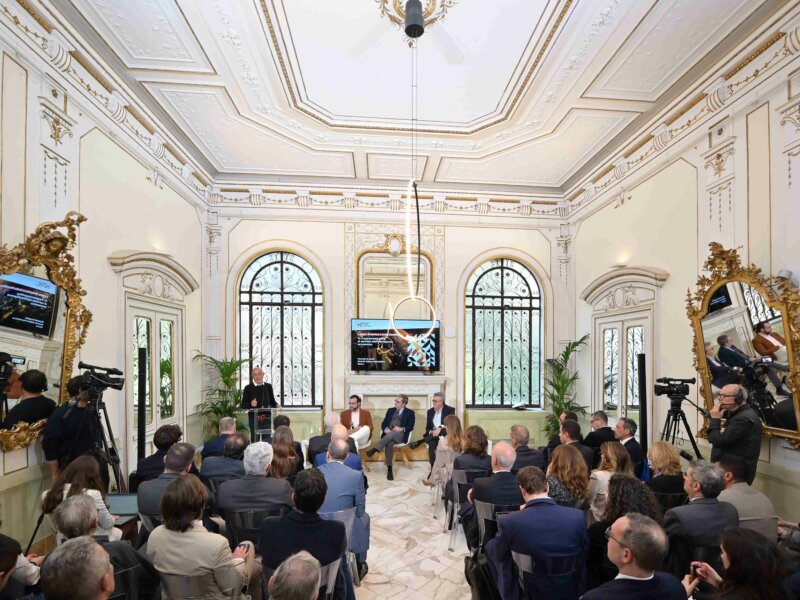As it lays “a bridge” to Ukraine, NATO also builds one across the Mediterranean
Seventy-five years after its foundation, NATO held a historic summit in Washington. Emiliano Alessandri puts the spotlight on NATO leaders’ new initiatives for the Mediterranean

The NATO summit held in Washington on 9-11 July has rightly been described as ‘historic” – and this time it may not be a hyperbole. The 75th birthday (the North Atlantic Treaty dates back to 1949) of the ‘most successful alliance in History’, as it is often described, offered much more than a purely celebratory occasion. Against the backdrop of a violent conflict in Europe that gives no signs of abating, but also lingering uncertainties – including complex election cycles in France, the US and other countries -, NATO leaders adopted a series of highly significant decisions aimed at proofing the organization for the years to come.
These include: committing to Ukraine’s ‘irreversible’ path towards NATO membership (a choice welcomed by Kiev, which will, however, have to wait a long time for a certain date); giving NATO structures a key coordinating role when it comes to security assistance and military support to Kiev, with a commitment of around 40 billion euros for the coming year; adopting a series of new initiatives on air and missile defense, including new components of the NATO integrated system in Poland; strengthening defense industry cooperation, including through the adoption of the NATO Industrial Capacity Expansion Pledge; bolstering NATO’s partnerships, particularly in light of a growing concern about the strategic and security implications of China’s rise in the Indo-Pacific region and beyond.
Somewhat below the radar but no less relevant, NATO leaders put forward new initiatives towards the Alliance’s ‘southern neighborhood’. While laying a bridge for Ukraine’s future membership in the organization, at the Washington summit NATO also decided to build a stronger bridge across the Mediterranean in order to avoid a complete imbalance with its strategic focus on the Eastern Flank. By doing this, NATO leaders heeded the requests made by countries like Spain (which had already secured Mediterranean-relevant text in the new Strategic Concept adopted in Madrid in 2022, just a few months after the Russian invasion of Ukraine) but above all Italy which, as a founding member of the Atlantic Alliance, has traditionally pushed for NATO’s engagement in the Mediterranean area. Over the years, this approach has led to a range of important initiatives, from the Mediterranean Dialogue with Algeria, Egypt, Israel, Jordan, Mauritania, Morocco, and Tunisia to Mediterranean-based naval operations such as Active Endeavour to combat terrorism – one of the very few based on the Alliance’s collective defense clause (Article 5) after the 9/11 attacks (NATO has carried out other important but more controversial non-Article 5 missions in the South, from Afghanistan to Libya).
In addition to more forceful language than in the past – ‘conflict, fragility and instability in Africa and the Middle East directly affect our security and the security of our partners’– the Washington summit declaration contains tangible deliverables, such as the decision to appoint a Special Representative for the Southern Neighborhood and the adoption of a (not publicly available but reportedly substantive) ‘action plan’ to reinvigorate the Alliance’s role in the region. NATO leaders also reaffirmed the key role of existing partnerships with the Mediterranean and Gulf countries. In this context, the relationship between NATO and Jordan will be further strengthened through the opening of a liaison office in the country, the first such initiative in the region, which will support the already privileged dialogue between NATO and the Middle Eastern country but also foster practical cooperation between the two, for example when it comes to tackling the climate change-security nexus. As far as the appointment of the Special Representative is concerned, this is a win for Italy, which had actively lobbied for this deliverable even as many sensitivities and some hesitations existed around this proposal both within the Alliance and among the southern partners. The new position will have a key role not only in ensuring greater visibility and impact for NATO activities in the Mediterranean area, but also in strengthening internal coordination – a much needed development as in recent years the Alliance has created new structures, such as the ‘Hub for the South’ in Naples, without effectively linking new and longer-term initiatives together.
With the conflict in Gaza exacerbating latent anti-Western sentiments in the region, and with many higher priorities on the table, the achievements reached in Washington about the ‘Southern Flank’ are noteworthy. The successful outcome was certainly influenced by the intensification of strategic competition. While unable to achieve its military objectives in Ukraine, Russia has continued to invest resources in the ‘Global South’, expanding its influence and footprint in the Middle East and Africa, a region where local governments remain reluctant to antagonize Moscow. The intensification of military cooperation between Moscow and Tehran has added a problematic layer to the challenge, effectively merging the Eastern and Southern Flanks. Together with transnational threats, from terrorism to organized crime, strategic competition has deepened the security interdependence that has been building for decades between the northern and southern shores of the Mediterranean. It is precisely by adopting the broad and long-term favored by Italy and other Mediterranean members of the Alliance – the Mediterranean was already a theater of geopolitical competition during the Cold War -, that NATO leaders have agreed to renew and reinforce NATO’s engagement with the South even as the conflict in Ukraine will continue to absorb much of the Alliance’s attention and resources in the East.



